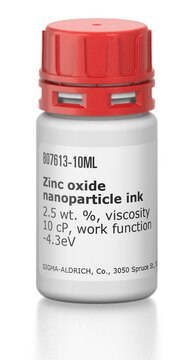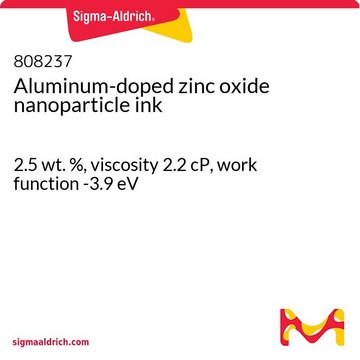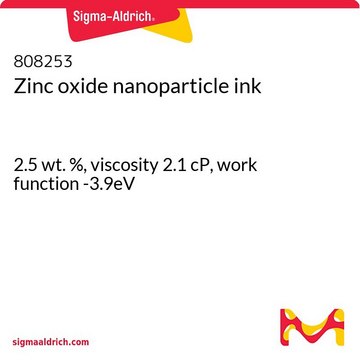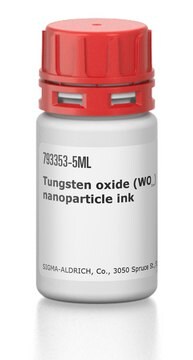901081
Zinc oxide ink for spin coating/slot-die coating
Synonym(s):
Helios′Ink H-SZ41029 semiconductive ink, Zinc oxide dispersion, Zinc oxide suspension, ZnO ink, ZnO nanoparticle ink
About This Item
Recommended Products
description
Conductivity: 10-8-10-7 S/cm (before illumination) and 10-4-10-3 S/cm (under illumination with UV light)
Valence band: 7.9 ± 0.1 eV
Work function: 4.0 ± 0.1 eV
Quality Level
form
liquid (dispersion)
color
light yellow
surface tension
20 mN/m±5 mN/m
viscosity
<4 mPa.s(20 °C)
capacity
≥0.9 % loading (Nanoparticles loading)
Related Categories
General description
- Helios′Ink H-SZ41029 semi conductive ink developed for the printed electronics is particularly well suited for flexible OLED and OPV.
- Helios′Ink H-SZ41029 semi conductive ink shows great performance on spin coating and slot die coating and is compatible with various flexible substrates (polyimide, PET, PET/ITO, etc.) but also Glass/ITO.
Features and Benefits
- Easy deposition under atmospheric conditions (temperature and pressure).
- Good optical performances (visible light transmission >90%).
- Non CMR ink.
- Compatible with ITO layer and Ag NWs layer.
- Compatible with most flexible substrates.
- Low drying temperature making printing onto flexible substrates possible.
- Thin layers are obtained (20 nm) with low roughness (RMS = 3±1 nm).
Preparation Note
- Can be homogenized for 5 minutes in an ultrasonic bath in order to get rid of any aggregates.
- Drying conditions: Oven, IR oven, vacuum oven.
- Clean-up solution: Ethanol/Acetone.
Legal Information
Signal Word
Danger
Hazard Statements
Precautionary Statements
Hazard Classifications
Aquatic Chronic 3 - Eye Irrit. 2 - Flam. Liq. 2 - STOT SE 3
Target Organs
Central nervous system
Storage Class Code
3 - Flammable liquids
WGK
WGK 1
Flash Point(F)
58.1 °F - closed cup
Flash Point(C)
14.5 °C - closed cup
Choose from one of the most recent versions:
Already Own This Product?
Find documentation for the products that you have recently purchased in the Document Library.
Articles
Professor Tokito and Professor Takeda share their new materials, device architecture design principles, and performance optimization protocols for printed and solution-processed, low-cost, highly flexible, organic electronic devices.
Our team of scientists has experience in all areas of research including Life Science, Material Science, Chemical Synthesis, Chromatography, Analytical and many others.
Contact Technical Service








